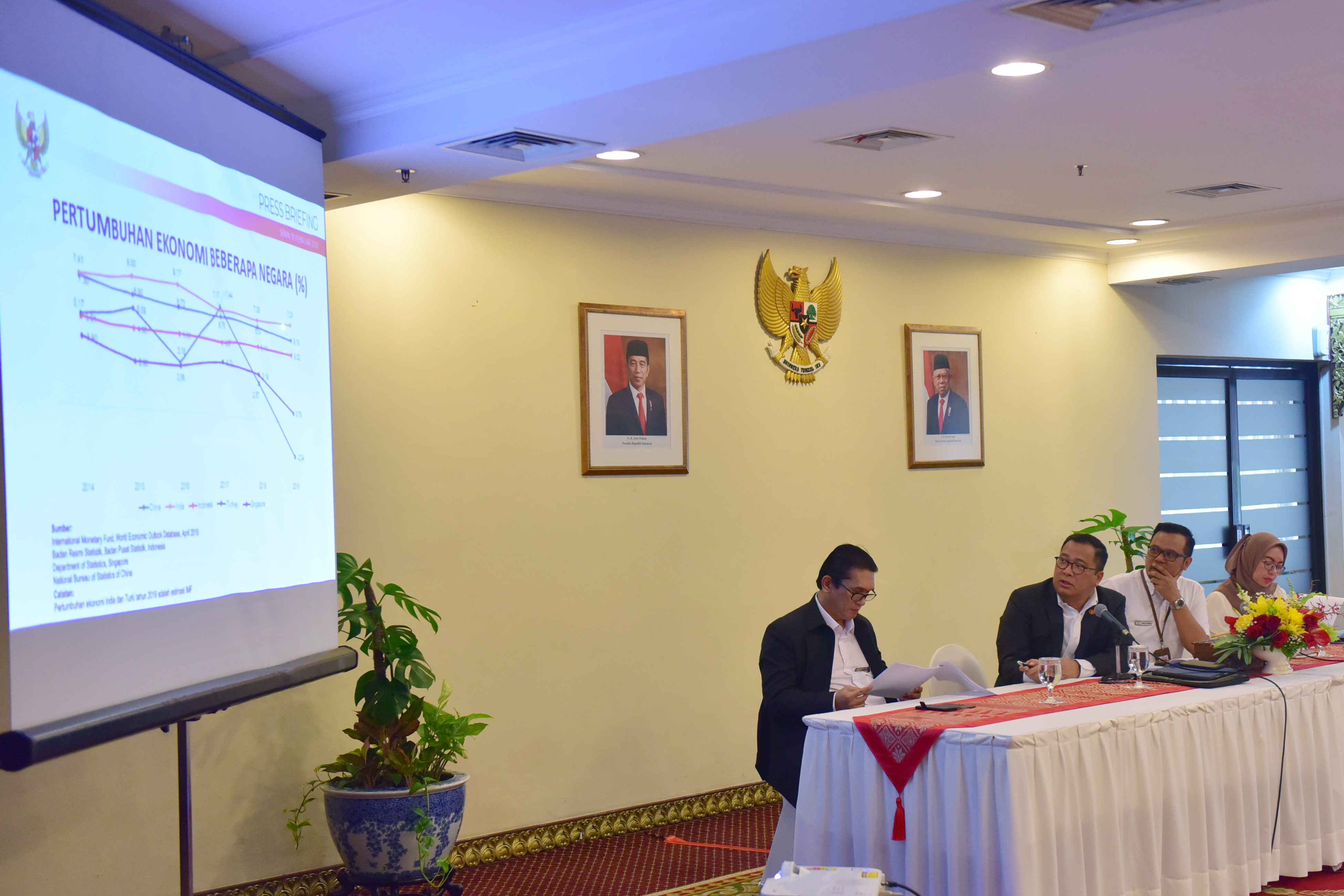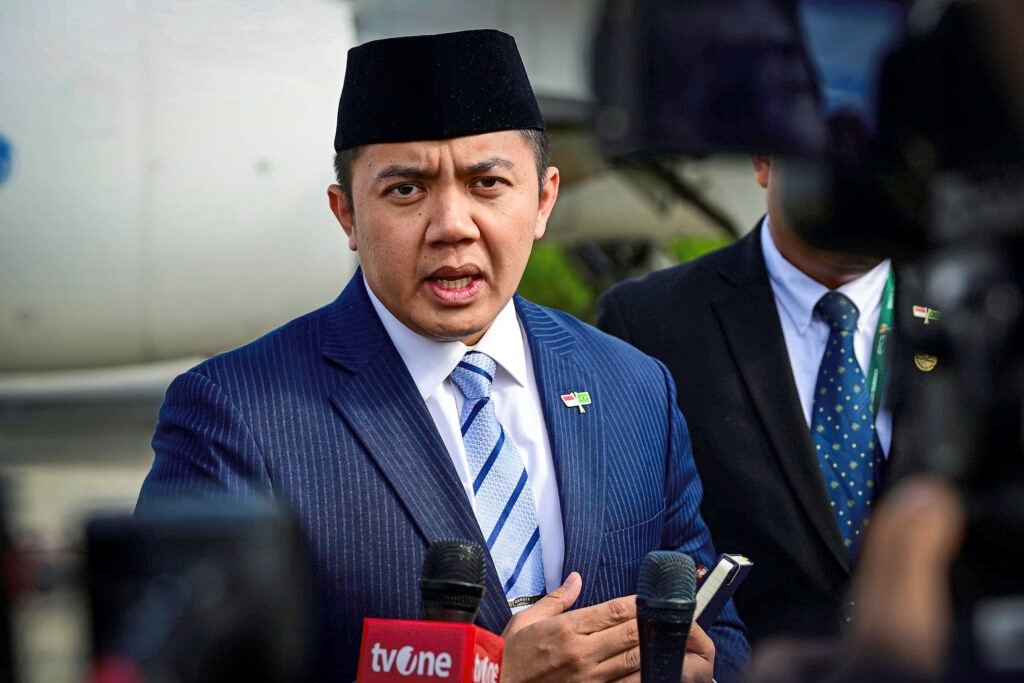Gov’t to Set Economic Transformation Strategy

Presidential Special Staff Arief Budimanta delivers his presentation on National Economic Update, at Wisma Negara building in the Presidential Palace complex, Central Jakarta, Monday (10/2). (Photo by: PR / Oji).
The Government has announced its plan to prepare a strategy aims to boost the country’s economic transformation for the next five years, Presidential Special Staff Arif Budimanta has said.
“First, we should encourage Government spending that potentially stimulates public consumption, including the distribution of village fund with a 40: 40: 20 scheme, Smallholder Business Credit (KUR), Prosperous Family Economic Development (Mekaar), micro capital service unit (ULaMM), ultra-micro financing (UMi), domestic product purchases, and labor-intensive programs,” Presidential Special Staff Arif Budimanta explained during the National Economic Update event at Wisma Negara building in the Presidential Palace complex, Central Jakarta, Monday (10/2).
Second, Arif continued, we should optimize the combination of fiscal and monetary policies in order to increase people’s purchasing power.
“Third, we should improve the interim dividend distribution between large-scale companies and State-Owned Enterprises (BUMN). Fourth, maintaining the stability of administered and food prices,” Arif added.
According to him, the next strategy is to use the omnibus law to stimulate investment and employment absorption. The last strategy is relaxation of macroprudential policy in order to increase the country’s domestic credit growth.
” Growth rate of the real gross domestic product (GDP) in the country from 2015 to 2045 is at 5.7 percent, while the real GDP per capita is at 5.0 percent. Indonesia has set target to be a developed country and among the fifth largest GDP (US$ 7.4 trillion) by 2045. The role of East Region of Indonesia (KTI) is also expected to rise by 25 percent,” Arif said.
Arif Budimanta went on to say that Indonesia’s economy is relatively stable at 5.02 percent growth amidst slowing down global economy.
“This is a qualified growth since it is stimulated by policy mix that drives real sector,” he said, adding that the country’s non-oil and gas export showed an increase in volume at 9.82 percent last year.
Arif further said that the value of several commodity prices has dropped, including coal that slips to 27% this year compared with last year and 2018, and crude palm oil (CPO) which has declined 6% year on year.
“This is the reason that makes our exports experienced a contraction of -86%, which caused by the cyclical aspect,” he stated.
The Government’s effort is shown by higher export volume up to 1 digit at 10%. However, the commodity is currently declining or depressed in price cyclically and it affects the country’s economic growth.
The current imports are dominated by auxiliary raw materials above 70 percent, so that the President requested that our national economic policies should be related to one another, for instance, ease of doing business improvement, both foreign and domestic investment.
On that occasion, Arief has mentioned several policies, including the improvement of foreign exchange policy and import substitution policy, especially import substitution that related to supporting raw materials.
“Regarding raw and auxiliary materials, we can see the extended operation (increased capacity of a petrochemical industry in Banten) as an example,” he said.
On investment policy, Arief said that the policy is expected to be able to generate foreign exchange for the country, import-substitution, and job creation, which also involves small and medium enterprises and cooperatives in terms of supply chain.
Arief also said that another strategy can be carried out through the development of special economic zones.
“The development of all special economic zones in the country will be directed to improve added value from industry, for example, special economic zones in East Kalimantan province for petrochemical development,” he explained.
According to him, the strategy of economic transformation will reduce commodity price fluctuation’s dependence due to improved added-value in the country.
On that occasion, Arief also explained several external and internal factors that affect the national economy in 2019 or 2020. External factors include low-interest rates in many developed countries and improved commodity prices.
“A number of risks that may arise, including slow economy trading partners, weak global trade and investment activities, the US-Iran tensions, the US-China trade war, Brexit, and Corona Virus Outbreak,” he explained.
Meanwhile, stimulating aspects of internal factors are political stability after the legislative and presidential elections, reduction in the benchmark interest rate (B17DRR) from 6% to 5% last year, stable inflation at the level of 2.72% (YOY), strengthened rupiah exchange rate, a significant focus on human resources, research and development, infrastructure, as well as the Omnibus Law.
“The risk that may come from internal factors is the possibility of El-Nino or La Nina as well as potential delay in derivative regulation and Omnibus Law,” Arief further said. (TGH / EN)
Translated by: Syarifah Aisyah
Reviewed by: Mia Medyana








